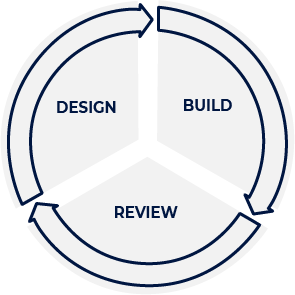Phase 2: Short course development
The second phase of the short course process is the development process, in which your learning design is translated into the learning platform. The development process is iterative and consists of repeated cycles of Design, Build and Review for each module. Each cycle ensures that materials and activities are in scope and meet the design brief and intended purpose. It also provides you the ability to make minor adjustments to the course design and materials throughout the construction process. These cycles will continue according to the Development project plan defined in Phase 1.

Design - Using the Module planner template, begin developing in more detail the content and activities that will be added to a learning platform.
Build - This stage refers to the actual creation of learning resources and activities and their addition and/or construction within a learning platform.
Review - This stage involves checking materials for clarity and ensuring that technical and scoping requirements have been met. To ensure a cohesive learning experience, you should conduct a final quality assurance review of the whole course at the end of the process.
Expand the sections below for more detailed information about each of the Phase 2 stages.
Up to this point, you should have planned at a very high level the learning outcomes and assessments for the whole of the course and then further defined the content and activities that would support learners in achieving the learning outcomes. In this phase, you are really starting to design materials and activities as they are intended to be presented to the learners. The intellectual input at this phase in the process is about pulling together the elements that create a learning experience that will best achieve learning outcomes and course objectives. Possible activities will be writing the text for the pages, selecting and sourcing readings or other supporting materials, writing directions for activities, and scripting video/audio content.
Once designed, the learning materials can be developed and the course built in the platform.
A curated list of how-to guides and common questions has been collated into the Building a course in OpenLearning article.
Also available are the in-built setup wizard and the OpenLearning Handbook to help you further explore the platform.
Once each module is built, it should be reviewed to ensure that the built material aligns with the project scoping and that the desired outcome has been achieved and remains consistent across the course. In the review, you might consider the following:
- Are the learning outcomes clearly articulated?
- Are all resources (content, activities and assessments) constructively aligned with, and support the learning outcomes with no extraneous/irrelevant content included?
- Is there enough contextual information/instructions to show the relevance of the material for learners and to guide them through the sequence of learning?
- Do the materials assume any prior knowledge or experience not covered in the course, and have commonly challenging/difficult topics been adequately addressed?
- Are there meaningful opportunities for learners to share with their peers and to receive feedback on their progress/understanding?
- Has all material been appropriately scaffolded and sequenced so that learners can engage with all necessary information/activities prior to being assessed?
- Is the navigation and experience logical and intuitive?
- Is the look, feel, and language used in learning activities and resources consistent and free from grammatical and spelling errors?
- If using synchronous sessions, how will they be utilised to build on short course content available in the platform?
Ideally, the feedback of each module review should feed forward in the development of remaining modules in the course or be noted and applied to future iterations of the course; therefore, it is useful to keep track of the outcomes of these reviews. At the completion of the development stage, a more comprehensive review of the entire course is recommended.



